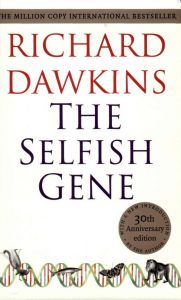 This year marks the 40th anniversary of Richard Dawkins’ The Selfish Gene, and much commentary has been written about it. In the popular imagination, Dawkins is first and foremost an outspoken atheist, and so many have overlooked his contributions to biology, and though these are great, spanning over a dozen books and documentary films, his reputation begins and ends with The Selfish Gene, which requires, at this remove, a good deal of context before it can be properly appreciated. Evolutionary biology had been struggling with the problem of altruism: why is it that creatures supposedly adapted to survive will so often sacrifice time, resources and even their lives to help their fellow creatures? Think not only of the mother selflessly laying down her life that her child might live, but also of the scores of bird species that voluntarily prune one another, dedicating precious minutes that could be spent foraging or mating to the cleaning of someone who may or may not ever return the favor.
This year marks the 40th anniversary of Richard Dawkins’ The Selfish Gene, and much commentary has been written about it. In the popular imagination, Dawkins is first and foremost an outspoken atheist, and so many have overlooked his contributions to biology, and though these are great, spanning over a dozen books and documentary films, his reputation begins and ends with The Selfish Gene, which requires, at this remove, a good deal of context before it can be properly appreciated. Evolutionary biology had been struggling with the problem of altruism: why is it that creatures supposedly adapted to survive will so often sacrifice time, resources and even their lives to help their fellow creatures? Think not only of the mother selflessly laying down her life that her child might live, but also of the scores of bird species that voluntarily prune one another, dedicating precious minutes that could be spent foraging or mating to the cleaning of someone who may or may not ever return the favor.
Biologists spoke of “the problem of altruism” because these behaviors seemed to present a challenge to Darwinian evolution. Various camps emerged to offer competing hypotheses. Perhaps, as some argued, the unit of evolution is really the species, whose members will therefore go to any lengths to ensure their own survival. Or perhaps, as others contested, it is the individual , and altruistic behavior is merely an adaptation that, on balance, serves the individual, even if they appear to be sacrificing in the short term. The Selfish Gene offered a competing hypothesis, and though his was not the only voice expressing it, Dawkins offered the most comprehensive and eloquent synthesis of the evidence. The unit of evolution, Dawkins contended, was not the species nor was it the individual; evolution takes place at the level of the gene, and individuals and species are merely advanced “survival machines,” vehicles carrying their genes into future generations. The idea is a humbling one: your entire existence, from your physical being to the thoughts and emotions that animate you, is the product of eons of evolutionary warfare.
The evidence Dawkins marshals is staggering, from zoology and endocrinology to game theory, and the result requires nothing less than a comprehensive paradigm shift, one that has yet to be completed. When, for example, you learn how successfully computer scientists have mapped out the behavior of certain bird species based purely on basic behavioral inputs, you begin to understand the true explanatory power of evolutionary theory, given greater explanation in works like Daniel Dennett’s Darwin’s Dangerous Idea.
There is another reason this book deserves its long life span: it was Richard Dawkins who coined the term “meme” (pronounced to rhyme with “gene”), and though the Internet has given this concept a life of its own, it, too, has explanatory powers that require closer inspection. Ideas, Dawkins theorized, also undergo a kind of evolutionary pressure, spreading and receding in the minds of human beings. Democracy and Christianity are memes, as are all faiths and philosophies, large and small. What pressures lead to their success or failure in society? If you, like Dawkins, wonder how thousand-year-old religions continue to find converts in an era of space travel and smartphones, you are studying memes.
I have, in previous postings, alluded to an impending ideological shift in the humanities and social sciences, one grounded in evolutionary biology. The struggle has been protracted, at much expense to human learning, but it’s conclusion was foregone. And when the history of that conflict is written, The Selfish Gene will be recognized as the thunderous opening salvo.